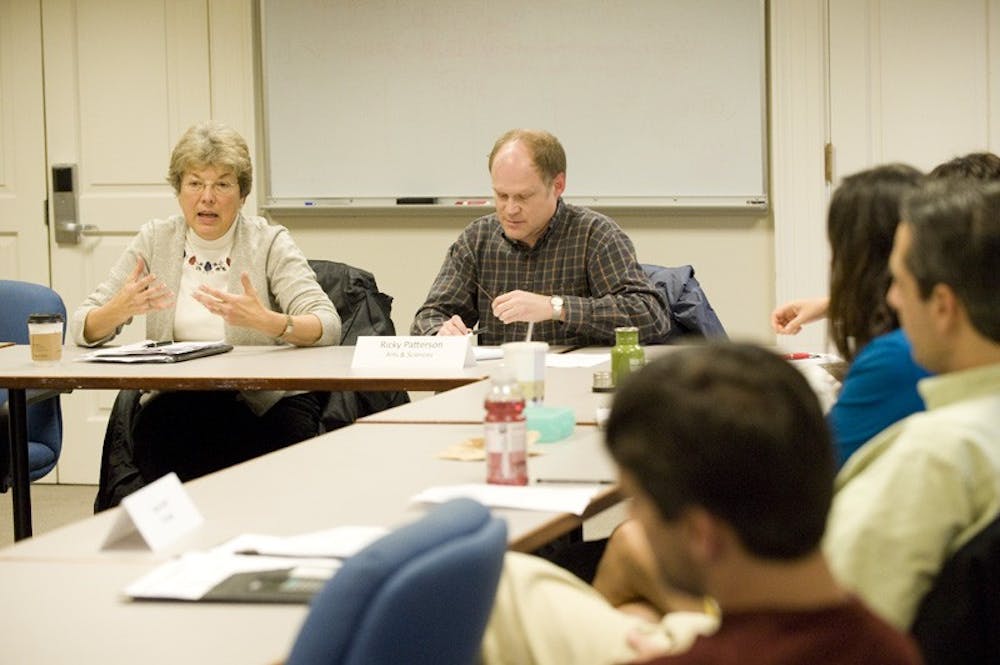The General Faculty Council met yesterday to discuss upcoming Faculty Senate proposals with Senate President and Nursing Prof. Ann Hamric.
Hamric outlined the Senate's priorities for the upcoming year to the Council, which represents non-tenure-track faculty and staff, highlighting the Senate's efforts to prepare departments and faculty for the University's upcoming change in leadership.
"Our chief priority is to work on the Senate's own responsiveness to our faculty constituents and our representativeness, in relation to getting ready to be an effective partner as we transition to a new president," she said.
Hamric also discussed a new Senate proposal, still in the works, that would alter copyright policies for faculty who submit articles to peer-reviewed journals.
Currently, Hamric said, faculty members forfeit copyrights to their own work when they submit manuscripts to journals for publication. The proposal would allow the University Library to obtain copyrights to these manuscripts one year after their initial publication, providing access to the University community and the general public.
"[This issue] has been a great test case for the Senate in terms of the issues of representativeness and getting the word out about this initiative to every faculty member because this is really an issue that affects all of our scholarly lives in terms of its focus," she said.
University Librarian Beth Blanton-Kent said all faculty who publish articles in peer-reviewed journals should take the time to familiarize themselves with the proposal.
"Everyone should become very well educated on it because it has direct implications for the future of publishing and libraries' access to information," she said.
Hamric also discussed the University's progress in disseminating the final report of the Faculty Senate Task Force on non-tenure-track faculty. The Task Force convened last spring to investigate the role of non-tenure-track faculty, particularly addressing whether non-tenure-track faculty feel marginalized or overlooked in academic departments.
The report suggested proposals for policies to improve the relations between non-tenure-track faculty and others in their departments, but efforts to circulate and institute these plans have hit a few snags.
The Nursing School has already instituted the proposed reforms, Hamric said, but Asst. Engineering Prof. Peter Norton said his school has not been as compliant.
"There are significant problems that are not getting the help of [Engineering School Dean James Aylor] yet," he said. Norton added that these problems tend to center around departments in the Engineering School that have small numbers of non-tenure-track faculty. Departments that employ large numbers of non-tenure-track faculty who are highly integrated in the workings of the department generally do not have these problems, he said.
Aylor disagreed with Norton's assertion that there are problems with the Engineering School's handling of non-tenure-track faculty, emphasizing that the school consistently works to ensure that they are not overlooked.
"We treat them very well," he said, adding, "We have an active involvement in making sure non-tenured track faculty are treated fairly."
Members also expressed their desire to create a joint committee composed of General Faculty Council and Faculty Senate members. Lecturer and Council member Penny Bowles said this type of committee would "give the Council a face," facilitating collaboration between the two groups.
Hamric, however, said the responsibilities of such a committee might place too great a strain on the schedules of faculty senators, who already spend a great deal of time dealing with the issues of their own body. A more effective approach, she said, would be to convene such a joint committee only as it is needed, to address a specific common issue.
"The most productive work is when we have an issue, and we put together people from both groups to work together on that group," she said.







